Gas Pipes Cost Estimator
Installing or replacing gas pipes in a residential, commercial, or industrial property is a critical project that requires careful planning and precise cost estimation. Whether you’re installing new gas lines for heating, cooking, or industrial processes, understanding the costs involved is essential for effective budgeting and planning. Estimate Florida Consulting provides expert cost estimator services to help you plan and execute your gas pipe installation or replacement project with precision, ensuring that your project stays within budget while meeting all safety and regulatory requirements.
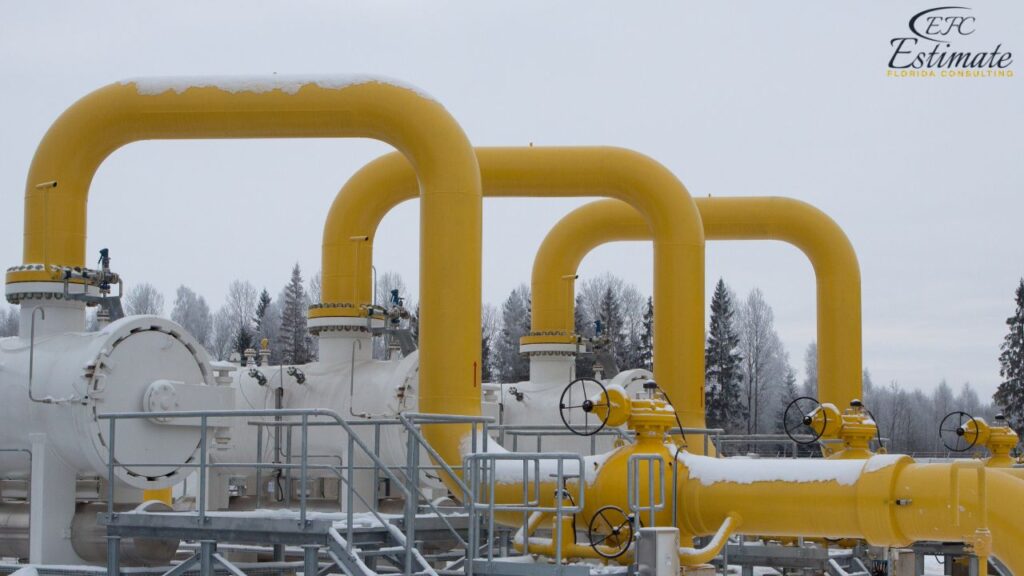
How much does it cost to install or repair a gas line?
The average cost to run a gas line now ranges from $470 to $960, while more complex jobs can exceed $1,300. Installing a new gas line typically costs between $16 and $33 per linear foot, covering labor, materials, piping, and permits. These costs vary depending on the distance from the gas supply, the project’s complexity, and the type of pipe used.
Cost Component | Cost |
National Average Cost | $715 |
Minimum Cost | $390 |
Maximum Cost | $1,950 |
Average Range | $470 to $960 |
- Converting from electric to natural gas or propane, or installing gas appliances, will always require new pipes.
- Final costs depend on whether you have existing gas lines in place or if new gas lines need to be installed from the gas supply to the house.
Project | Average Cost | Description |
Line Extension | $325 – $650 | A gas line already exists to the home to install a branch or extension of tubing for a new appliance. |
New Line From Meter | $650 – $2,600 | A new gas line is required from the meter to increase gas supply, which increases distance and complexity. |
New Line To Street | $2,600+ | Converting your home to natural gas, or if the current line is at capacity, you’ll need to install a new gas line from the street to your house. This is in addition to any interior gas lines or extensions that need to be installed. |
Gas Pipes Videos
Gas Line Installation
Natural Gas
Gas Line
Gas Line Installation Costs
Installing a new gas line from the gas supply throughout the house now typically costs between $1,690 and $4,550, with most homeowners spending an average of $2,600, or approximately $26 per linear foot. Costs largely depend on the number of appliances and the distance from the gas supply.
ange | Average Cost |
National Average Cost | $2,600 |
Minimum Cost | $920 |
Maximum Cost | $12,350 |
Average Range | $1,690 – $4,420 |
Natural Gas Installation By Appliances
For a small house that doesn’t require outdoor pipes, costs can be as low as $920. However, extremely complex projects with high connection fees, long laying distances, and high-end materials can cost up to $12,350.
Appliances | Average Cost |
1 Appliance & Water Heater | $1,690 – $2,210 |
3 Appliances & Water Heater | $1,950 – $3,250 |
5 Appliances & Water Heater | $2,210 – $4,420 |
A gas line will first need to be run from the street to the house, with a meter installed, followed by gas lines inside the home from the meter to the new appliances. Costs can vary significantly based on the installation’s complexity and the size of pipe and connections each appliance requires.
For example, digging a trench for the pipe in a straight line is more cost-efficient than Horizontal Directional Drilling (HDD), which is necessary to create a tunnel when adding new lines under a driveway, sidewalk, road, or other obstacles.
Labor Cost to Install Gas Line
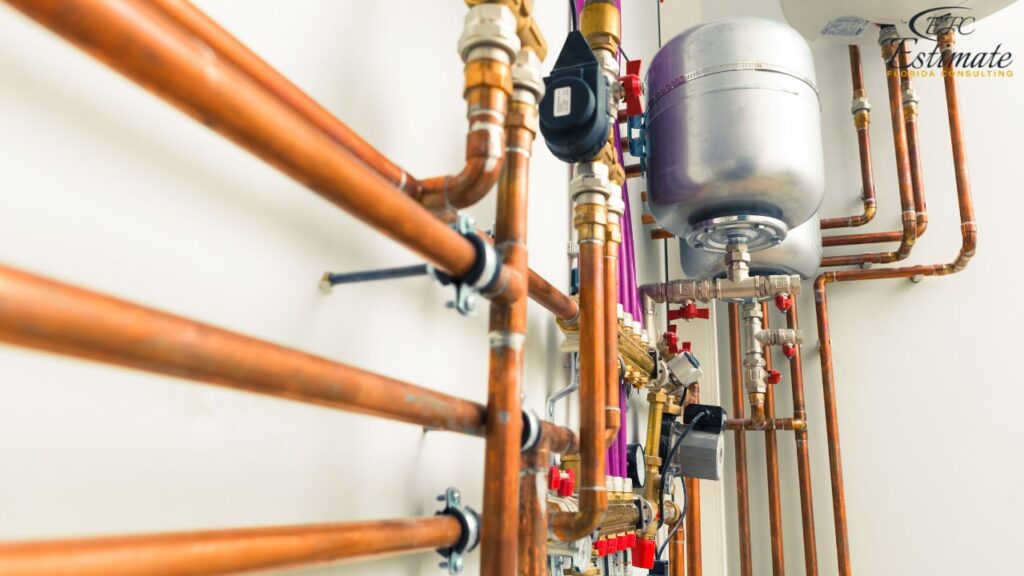
The average labor cost to install a gas line now ranges from $3.90 to $14.30 per linear foot, depending on the pipe’s diameter and job complexity. Licensed plumbers charge between $58.50 and $195 per hour, with an average rate of $130 per hour, to place new gas lines.
Hiring a licensed master plumber to install home gas lines is highly recommended. Many states require a licensed professional due to the risks associated with connecting gas to a home. While an apprentice plumber may charge significantly less, they may only be suitable for minor pipe repairs.
Gas Pipe Installation Material Costs
The average material cost for installing or repairing gas lines is now $1.30 to $13 per linear foot, with an average of $5.20 per foot. This includes piping, connectors, fittings, and mounting hardware. Pricing varies based on the type of pipe, diameter, number of turns, and location (interior, exterior, underground).
Types of Gas Pipes and Cost
Material Type | Cost Per Linear Foot | Uses & Drawbacks |
Black Iron | $6.36 | Uses: Interior and exterior use, stronger than plastic pipe, fits together with compound, airtight. Drawbacks: Can corrode over time, no national standards, can crack during an earthquake due to rigidity, sealant can deteriorate. |
Galvanized Steel | $2.85 – $12.13 | Uses: Interior and exterior use, energy-efficient, durable. Drawbacks: Needs to be welded. |
Flexible Corrugated Stainless-Steel Tubing (CCST) | $2.60 – $5.20 | Uses: Used in tight areas and locations with a high risk of natural disasters, flexible and easy to install. Drawbacks: Can crack over time, limited use. |
Copper | $1.34 – $3.43 | Uses: Regions without natural gas, also made in the form of flexible coils. Drawbacks: Not allowed in some municipalities, can clog pipes with copper sulfites if soldered incorrectly. |
High-Density Polyethylene (HDPE) | $1.29 | Uses: Underground exterior lines, non-toxic, flexible, and suitable for high PSI. Drawbacks: Can buckle from sharp rocks and tree roots. |
Polyvinyl Chloride (PVC) | $0.29 – $2.02 | Uses: Underground exterior lines, won’t develop pinhole leaks, and won’t corrode. Drawbacks: Can crack or break during installation. |
Underground Gas Line Installation Cost Per Foot
The average cost for underground gas line installation is now $15.60 per linear foot, with prices ranging from $13 to $32.50 per foot. This includes trenching, shaping, backfill, labor, and materials. However, more complicated gas line installations can cost as much as $97.50 per foot.
Costs vary based on the amount of work required. Preparing the site, digging the trench, and filling the trench can be both time-consuming and complex. Underground gas line installation requires piping that meets specific standards, which generally costs more than non-underground projects.
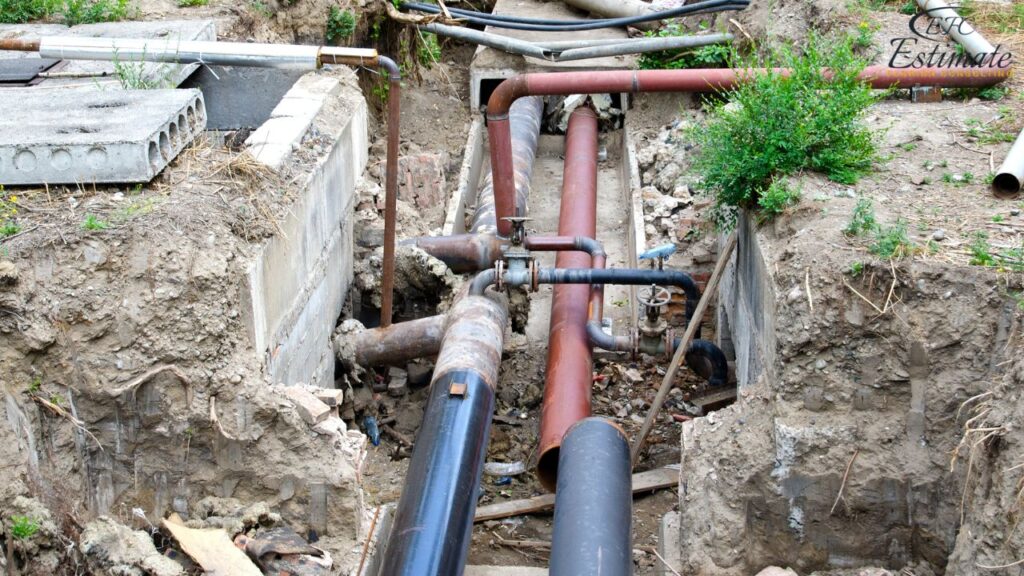
Gas Line Installation Cost Per Foot
Task | Cost Per Linear Foot |
Trenching, Shaping, Backfill | $5.20 – $15.60 |
Labor and Materials | $7.54 – $17.81 |
Total | $12.74 – $33.41 |
Black Iron and Galvanized Steel Gas Pipe
Installing black iron gas pipe now averages $6.37 per linear foot, while installing galvanized steel ranges between $2.86 and $12.09 per linear foot. Both types of pipes require more labor than PVC and HDPE piping.
- Black Iron Pipes are highly durable, making them ideal for transporting natural and propane gas from the street or tank to a home. They also offer high heat resistance, which is crucial for gas line applications.
- Galvanized Steel Pipes are more commonly used in irrigation and water supply lines, but they are generally not used in new construction today. These pipes are more often found in older homes built before the 1970s.
PVC and HDPE Piping
- PVC Piping installation now costs between $0.26 and $2.08 per linear foot, compared to HDPE’s average installation cost of $1.30 per linear foot. Both materials are considered better alternatives to metal pipes for low-pressure gas lines.
- PVC Piping can be reliable for up to 50 years after the initial settling, which typically occurs during the first two decades.
- HDPE Piping is more durable and can withstand higher temperatures than PVC. HDPE can also absorb shockwaves, but it must be approximately 2.5 times thicker than PVC to handle the same pressure.
Cost to Run Natural Gas Line From Street to House
Installing a natural gas line from the street to your house now costs between $0 to $2,600, with most homeowners spending around $1,274 for an average of 49 linear feet of connected pipe. The average cost ranges from $15.60 to $32.50 per linear foot, though some gas companies may offer free installation depending on the distance.
The location of your house, any obstructions, the distance from your home to the main line, and local building codes can significantly increase costs, though they typically do not exceed $2,600. In many cases, the gas company installs, owns, and maintains the gas line and gas meter up to your home.
Potential Fees from Your Gas Company
When installing a gas line, ask your gas company about the following potential fees:
- New account fee
- Callout fee
- Tap fee
- Permit fee
- Extension fee
- Final inspection
Connecting to a Gas Main Cost
The typical cost to connect to a gas main line now ranges from $260 to $390. The total cost to connect depends on many variables, so it’s essential to contact your gas supplier to inquire about application fees, initial inspection costs, and connection fees.
Free or Low-Cost Main Gas Line Installations
Some gas companies offer free or low-cost main gas line installations. Before contacting your gas supplier, check the following details to see if you qualify for a free or low-cost installation:
- Distance of Installation: Short distances up to 100 feet, with a connection to a gas-run heating system, may be provided free of charge and include the gas line and meter.
- Multiple Houses: In rural areas, connection costs can be split or reduced by having multiple houses connected simultaneously.
- Edge of Property: In some rural areas, a connection to the edge of a property may be offered for free, though additional costs will apply to the rest of the property.
Gas Shut-Off Valve Installation
The cost to install a gas shut-off valve now ranges from $65 to $182 per appliance, including both labor and materials. Materials cost between $19.50 and $65 per valve, while labor rates range from $58.50 to $195 per hour. A shut-off valve is essential for turning off the gas supply to the home when an appliance requires repair or in emergencies.
In earthquake-prone areas, the total cost for installing a gas line shut-off valve averages between $260 and $780 per appliance. Each flexible earthquake shut-off valve costs between $130 and $390, with installation labor averaging between $130 and $390 as well.
Some gas suppliers may install a shut-off valve at no cost. It’s advisable to check with your gas supplier about installation fees before scheduling the service.
New Gas Meter Install Cost
The average cost for installing a new residential gas meter is now between $260 and $390, with installation labor adding another $130 to $390. Often, you won’t need to pay anything because gas companies typically own, maintain, and install the lines and meters up to your home.
Gas Meter Installation Cost
Gas Meter Type | Average Cost |
Residential Meter | $260 – $390 |
Commercial Meter | $520 – $1,300 |
Install Labor | $130 – $390 |
Installation and replacement costs are often similar, although replacements generally do not incur additional fees, such as application fees. New meters must comply with regulations and code requirements for their placement, and gas providers may require specific meters for their services, limiting your options.
Connecting a Propane Tank to a Gas Line
Connecting a propane tank to a gas line or yard line is typically free, or it may cost around $97.50 if you’re currently leasing or plan to buy a tank from a gas supply service and commit to purchasing a minimal amount of gas annually.
Be sure to check your lease agreement for the exact hookup prices. A plumber or propane tank professional will use copper or polyethylene tubing to connect a new propane tank line, a process that usually takes just a few minutes.
Purchasing and Installing a Propane Tank
The cost of purchasing and installing a propane tank ranges from $520 to $3,640. While buying a propane tank involves higher upfront costs, it is more cost-efficient in the long run.
Leasing a Propane Tank
Leasing a propane tank costs between $65 and $260 per year from a local gas company. Most companies will install leased tanks for free, provided you purchase a minimum amount of gas annually.
New Gas Pipe Installation Costs
Switching appliances from electric to natural gas can be more cost-efficient, with reported savings of up to 30% after conversion. Beyond utility cost savings, some utility companies also offer rebates for installing gas appliances.
Cost to Run a Gas Line by House Size
House Size | Line to 1 Room | Line to 2 Rooms | Line to 3 Rooms |
Smaller House (25 LF) | $260 | $507 | $767 |
Larger House (53 LF) | $546 | $1,079 | $1,690 |
A full conversion from electric to natural gas appliances will be more expensive if you don’t currently have gas. New costs will include rerouting from an existing gas line, in addition to other installation expenses. The basic cost to install one new appliance now ranges between $1,690 and $2,210.
New Gas Pipe Installation Costs
Item | Average Cost |
Run Line from Street to House | $0 – $2,600 |
Connection to Gas Main | $260 – $390 |
Run Lines in House | $468 – $962 per line |
Connections to Appliances | $65 – $390 per appliance |
Standard Shut-off Valves for Appliances | $65 – $182 per appliance |
Gas Meter and Labor to Install | $0 – $780 |
Cost to Install Gas Line for Kitchen Stove
The average cost to install a gas line for a kitchen stove is now $19.50 to $32.50 per linear foot. Total costs range from $260 to $1,300+ depending on the length of piping needed to connect to the main gas supply, which typically averages 30 feet.
Cost to Convert Electric Stove to Gas
The cost to convert an electric stove to gas now averages $520 if an existing gas line is available. Converting to a gas stove is more energy-efficient, as gas burners require less time to heat and cool, and they cook food more evenly.
Cost to Run Gas Line for Grill or Fire Pit
Running a gas line to a grill or fire pit now costs approximately $26 to $32.50 per foot, or $260 to $910 on average, depending on the distance from the main gas line. Installing a natural gas line for a grill costs between $130 to $780, while a fire pit located farther out in the yard may cost between $390 to $1,820.
Cost to Run Gas Line to Dryer
The cost to run a gas line to a dryer ranges from $195 to $1,300, with an average cost of $455.
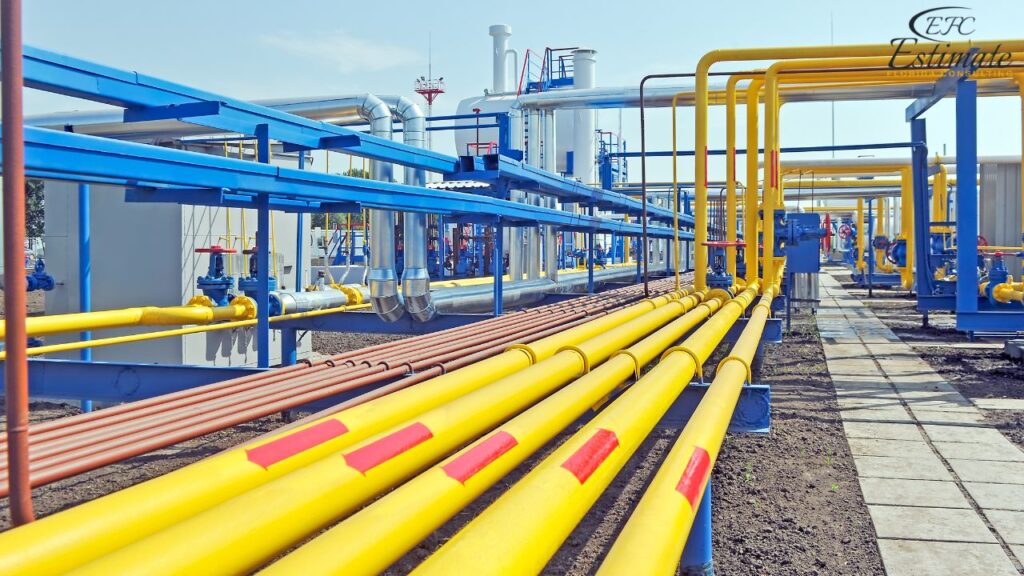
This includes connecting the new line to the dryer. Gas dryers are generally more cost-efficient than electric dryers, although the initial cost of a gas dryer is often higher, including the cost of the dryer.
Cost to Install Gas Line for Fireplace
The total cost to install a gas fireplace, including the gas line, now ranges from $2,990 to $5,200. If you’ve already purchased the fireplace, expect to spend between $15.60 to $32.50 per linear foot to run a line from the manifold. Once installed, operational costs for a natural gas fireplace run about $0.91 per hour, while using propane costs approximately $2.99 per hour.
Water Heater and Furnace Gas Line Installation
Installing a gas line to power a water heater and furnace typically costs between $455 and $780. Additionally, furnace replacement costs range from $2,600 to $7,020. If you’re upgrading from electric to gas, water heater installation costs now range between $780 to $4,030 for the unit and labor.
Other costs to consider include permits and inspections, which may range from $65 to $390.
Cost to Add Gas Line to Pool Heater
Installing a new gas line for a pool heater costs between $910 and $1,820, including the connection and the new gas line. The connection alone costs between $220 and $390, excluding any applicable callout fees.
Gas pool heaters are ideal for quickly heating a pool for short periods and maintaining the pool’s temperature more effectively than other types of heaters, making them suitable for pools that are not used regularly.
Generator Gas Line Installation
A whole-house generator installation, including the gas line, now costs between $7,800 and $14,300. The cost varies depending on the type and size of the generator and the extent of the house connected.
Cost to Run Gas Line to Garage
The average cost for running a gas line to the garage is now between $10.40 to $20.80 per linear foot. The price is comparable to running an outside gas line, with the primary variable being the distance to the garage.
Gas Line Leak Repair Costs
Gas leak repairs now cost approximately $7.80 to $9.10 per linear foot or $97.50 to $195 per hour. The location of the leak significantly affects the repair cost. Repairing a gas pipe for a single appliance ranges from $195 to $845, depending on the distance, location, and pipe material.
- Excavation: If the pipe is difficult to access, excavation costs can range from $1,300 to $6,500 to reach the leak.
- Drywall: Repairing leaks in pipes within walls can increase costs due to additional drywall repair expenses.
- Testing: A preventative check on your gas lines costs $65 to $97.50 per visit and should include a pressure test to accurately check for leaks. Testing can save you substantial amounts of money in the long run.
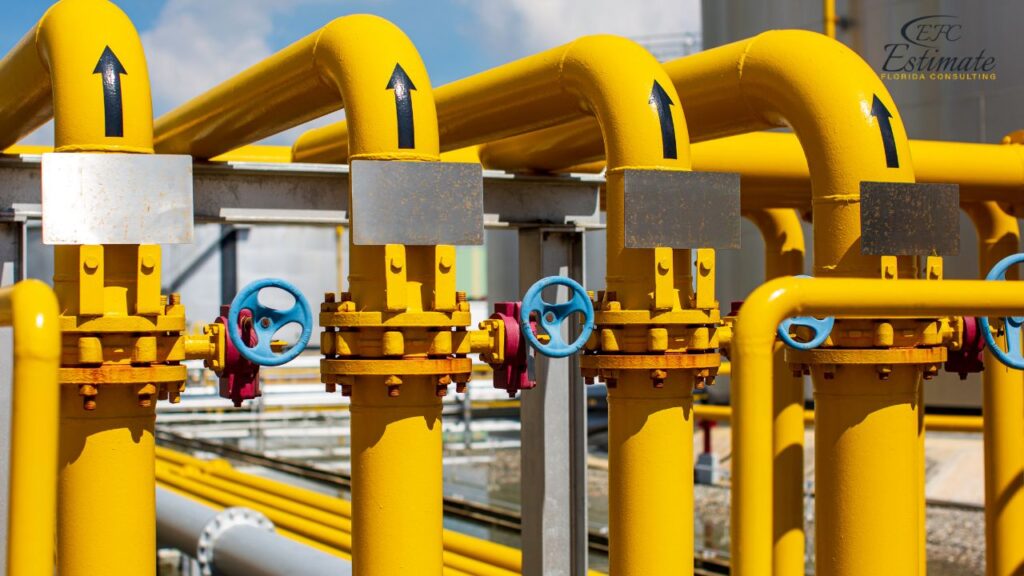
Gas companies generally do not charge for the initial visit, as their priority is to stop any gas leaks or problems. Be aware that your gas bills may be higher than usual if you have a small leak.
Gas Line Replacement Cost
The typical gas line replacement cost is now $10.40 per linear foot. The minimum cost for gas pipe replacement is typically around $390, with an average of about $910. Companies may charge a flat rate or a minimum fee. Replacing gas pipes in an entire home can cost between $3,900 and $9,100.
Gas Line Pressure Test Cost
A gas line pressure test is usually included in a plumber’s service call charge or is priced at a flat rate of $97.50 to $195. In some areas, a thorough 12- to 24-hour test is required, which can cost between $195 to $650.
A standard pressure test takes 15 to 30 minutes. The gas valves to all appliances will be shut off, and a plumber will remove the main line cap to check the pressure with a gauge.
Cost to Cap a Gas Line
The cost to cap a gas line is typically covered by a plumber’s callout fee of $65 to $260 and takes about 30 minutes. For multiple gas lines that need capping, expect to spend $32.50 to $117 per cap. Capping a gas line prevents leaks when switching to electric appliances or removing an appliance.
Cost to Install a Drip Leg
The average cost to install a drip leg is now $97.50 to $195, which is a plumber’s minimum charge. For multiple installs, costs range from $42.90 to $115.70 per drip leg. Drip legs capture moisture so that it doesn’t enter the control unit. Although small pieces of sediment may get through a drip leg.
The part costs around $18.20 per drip leg, and it may be possible to install it yourself as a DIY project.
Get 5 New Leads Next 7 Days With Our System
- Multi-Family House
- Single-Faimly House
- Modern House
- Duplex
- Ranch House
- Bungalow
Gas Line Sediment Trap Cost
Plumbers charge between $97.50 to $195 to install a gas line sediment trap. Sediment traps capture moisture and sediment to prevent them from entering the control unit. Unlike a drip leg, the flow of gas is altered to remove any sediment. A sediment trap may be included in a drip leg installation.
The sediment trap parts cost $13 to $18.20 each, and plumbers can typically install them within an hour.
Connecting a Vent to a Gas Line
The cost to connect a vent to a gas line is now approximately $13 to $19.50 per linear foot. Fittings and regulators are typically included in the materials costs for each gas line. Additional fees and permit costs may also apply.
Cost to Move a Gas Line or Pipe
The average cost to move or reroute a gas line is now $19.50 to $32.50 per linear foot. Factors contributing to the final price include the type of piping, distance, and conditions. If new appliances are being added, you may require a new installation, as modern appliances often need wider pipes.
Cost to Move a Gas Meter Outside
The typical cost to move a gas meter outside is also $19.50 to $32.50 per linear foot, excluding an $104 connection cost. Moving a gas meter can have very diverse requirements; some gas companies may move it for free, while others could charge up to $5,200.
Gas Line Extension Costs
Gas line extension costs now range from $15.60 to $32.50 per linear foot. Costs depend on construction barriers, the type of extension required, and the pipe material used. If the existing gas line isn’t up to code, the entire line may need to be replaced. While extensions are typically less costly than adding a new gas line, they are not always recommended based on these factors.
Cost Factors to Install or Repair Gas Lines
Several key factors affect the cost of a new gas line. Before starting, it’s essential to understand the basics of your existing configuration—from your current appliances and home’s existing gas lines to adding a new line and the type of gas you use.
Additional Cost Factors
- Required Permits: These tend to range from $65 to $390.
- Annual Gas System Inspections: Cost between $130 to $195 per inspection.
- Trenching Costs: Range from $6.50 to $15.60 per linear foot, depending on the depth. A permit is usually required before trenching.
- Complex Installations and Repairs: These will increase the time and costs required to complete the project.
- Landscaping Repairs from Trenching: Costs range from $650 to $2,600+ depending on the landscaping setup. Replacing sod is much cheaper than running a line under a patio.
- Concrete Costs: Typically average $162.50 per cubic yard.
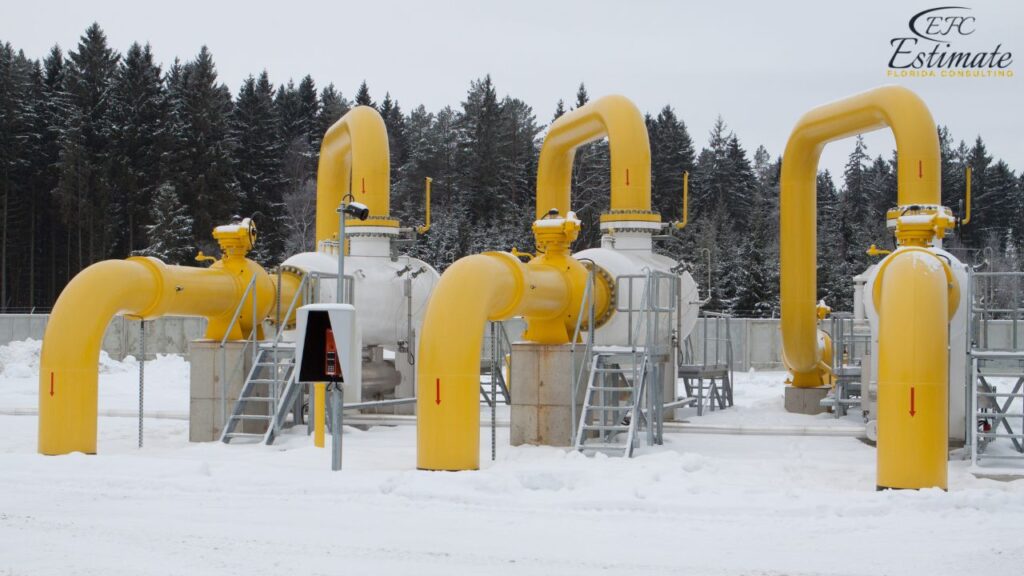
Accounting for Gas Appliances
Determine how many gas appliances you have in your home. Pricing changes based on pipe size, which is determined by the BTUs all of your appliances are using.
- Create a list of all your gas appliances.
- Record the gas input from the table or nameplate of each appliance.
- Check the gas meter (for natural gas) for the ID size.
Gas Type: Propane or Natural Gas
The cost is roughly the same for installing a propane gas line from the tank to the house as for having natural gas run to the house. Identify which type of gas your home currently uses:
- Propane Gas: Stored in tanks, usually outside the home.
- Natural Gas: Supplied by a local or city utility company, similar to power bills, with a meter outside your home instead of a tank.
When building a new home or if you currently do not have gas, there are several benefits to each type. Understanding the differences between propane and natural gas will help you choose the right one for your individual needs.
Gas Line Pipe Size
The amount of piping currently in your home and the size of the tubing are determining factors in your total costs. If the existing gas line has the capacity to add a new gas appliance, the costs will be significantly lower than a new installation. If a system is already at capacity, a new line will need to be installed to the gas manifold.
Download Template For Gas Pipes Project Breakdown
- Materials list updated to the zip code
- Fast delivery
- Data base of general contractors and sub-contractors
- Local estimators

Conclusion
Installing or replacing gas pipes in any property is a crucial task that requires detailed planning and accurate cost estimation. Whether you’re upgrading to natural gas for heating or installing new gas lines for appliances, understanding the various costs involved is vital for successful budgeting. From running a new line from the street to installing gas lines inside your home, costs can vary widely based on factors like distance, pipe material, and project complexity. Estimate Florida Consulting offers expert cost estimation services, ensuring your gas pipe installation or repair project is completed safely, efficiently, and within budget.
FAQs
The average cost to install or repair a gas line ranges from $470 to $960. However, complex jobs can exceed $1,300. The cost per linear foot typically ranges from $16 to $33, which includes labor, materials, piping, and permits.
Several factors influence the cost of installing gas pipes, including the distance from the gas supply, the complexity of the installation, the type of pipe used, and whether you’re running a new line or extending an existing one.
Installing a new gas line from the meter typically costs between $650 and $2,600, depending on the distance and complexity. If you need a new line from the street, costs can exceed $2,600.
Here’s a general breakdown of costs for various gas pipe materials:
- Black Iron: $6.36 per linear foot
- Galvanized Steel: $2.85 – $12.13 per linear foot
- Flexible Corrugated Stainless-Steel Tubing (CCST): $2.60 – $5.20 per linear foot
- Copper: $1.34 – $3.43 per linear foot
- High-Density Polyethylene (HDPE): $1.29 per linear foot
- Polyvinyl Chloride (PVC): $0.29 – $2.02 per linear foot
The cost to run a gas line from the street to a house ranges from $0 to $2,600, with an average cost of $1,274. Costs per linear foot vary from $15.60 to $32.50, depending on the distance and any obstacles.
Labor costs for installing gas lines range from $3.90 to $14.30 per linear foot, depending on the pipe diameter and job complexity. Licensed plumbers charge between $58.50 and $195 per hour, with an average rate of $130 per hour.
The cost to install gas lines varies by appliance:
- 1 Appliance & Water Heater: $1,690 – $2,210
- 3 Appliances & Water Heater: $1,950 – $3,250
- 5 Appliances & Water Heater: $2,210 – $4,420
The cost to install a gas line for a kitchen stove ranges from $260 to $1,300+, depending on the length of piping needed, which typically averages 30 feet.
Converting an electric stove to gas costs around $520 if an existing gas line is available. This conversion is more energy-efficient and often leads to long-term savings.
The total cost to install a gas line for a fireplace ranges from $2,990 to $5,200. If the fireplace is already purchased, expect to spend between $15.60 to $32.50 per linear foot for the gas line.
Installing a new residential gas meter costs between $260 and $390, with additional installation labor costs ranging from $130 to $390. Commercial meters cost more, ranging from $520 to $1,300.
Additional costs may include:
- Permits and Inspection Fees: $65 to $390
- Energy Efficiency Upgrades: $200 to $1,000
- Trenching Costs: $6.50 to $15.60 per linear foot
- Annual Gas System Inspections: $130 to $195
The cost to move or reroute a gas line is $19.50 to $32.50 per linear foot, depending on the type of piping, distance, and conditions. Moving a gas meter outside also falls within this cost range.
Hiring a licensed professional ensures that gas lines are installed safely and meet all regulatory requirements. Many states require a licensed professional due to the risks associated with gas connections, and professional installation reduces the risk of leaks, misalignment, and other hazards.
Estimate Florida Consulting provides expert cost estimator services to ensure your gas pipe installation or replacement project is completed safely, efficiently, and within budget. Our services help you navigate the complexities of gas line installations, ensuring compliance with all safety and regulatory requirements.
Google Reviews



Process To Get Gas Pipes Cost Estimate Report
Here I am going to share some steps to get gas pipes cost estimate report.
-
You need to send your plan to us.
You can send us your plan on info@estimatorflorida.com
-
You receive a quote for your project.
Before starting your project, we send you a quote for your service. That quote will have detailed information about your project. Here you will get information about the size, difficulty, complexity and bid date when determining pricing.
-
Get Estimate Report
Our team will takeoff and estimate your project. When we deliver you’ll receive a PDF and an Excel file of your estimate. We can also offer construction lead generation services for the jobs you’d like to pursue further.

